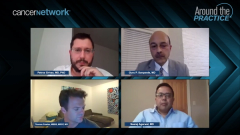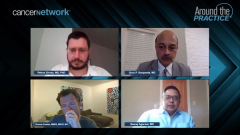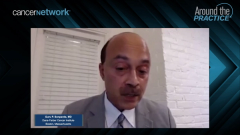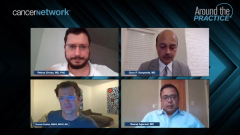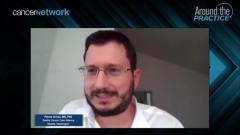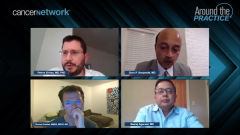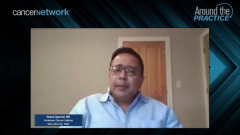
Carboplatin vs I/O in Cisplatin-Ineligible Urothelial Cancer
Experts in bladder cancer comment on the role of PD-L1 testing in the frontline setting for advanced urothelial cancer and its impact on the use of up-front carboplatin or immunotherapy.
Episodes in this series

Petros Grivas, MD, PhD:Let me go to the polling question to see what the audience thinks. In patients who are ineligible, not fit for cisplatin but eligible for carboplatin, would you use a carboplatin-based regimen? Professor Powles mentioned carboplatin and gemcitabine with a potential of avelumab maintenance if there is a response and stable disease. Or you would go for immune checkpoint inhibitor up front, and we just discussed this just a minute ago. If you can vote, please, carboplatin-gemcitabine followed by avelumab maintenance, potentially, or checkpoint inhibitor. As people vote, I just want to comment that in Europe, you have to check PD-L1 expression. Right, Tom? Even if you’re not fit even for carboplatin, you still need to check PD-L1 in Europe. Is that right?
Thomas Powles, MBBS, MRCP, MD: While people are voting, the PD-L1 issue is very complicated. The biomarker is incredibly inconsistent. I’ve led a number of trials that have been reliant on the biomarker; they’ve all failed. We’ve never had a positive biomarker trial. We’ve had 3 or 4 big randomized negative biomarker trials. The PD-1 biomarker is really important. There are 5 PD-L1 biomarkers, and like the variants of coronavirus, they’re all completely different from one another. And the SP142 biomarker with atezolizumab is completely different from the…biomarker with nivolumab. A different portion of patients is positive. One is TC [tumor cell] staining, one is IC [tumor-infiltrating immune cell] staining. One is 5%, one is 6%. Actually, the biomarker story has become really complicated. If you asked me right now, is the biomarker helping patients in urothelial cancer? The answer is no. If you look at, for example, the KEYNOTE-361 trial, the hazard ratio was numerically lower in the biomarker-negative patients than the biomarker-positive patients. This whole “Make sure we do the biomarker” story, for me, has become a really gray area. That doesn’t mean we should be ignoring the biomarker and treating loads of patients with upfront immune therapy. It’s much more complex than that. As I said before, if you treat 10 patients with up-front immunotherapy, 6 will have progression of disease as best response and 4 of those 6 will progress and you’ll never get second-line therapy into them. There may be 1 or 2 winners, but there are going to be 3 or 4 losers, and that’s quite an arc, because we don’t know who those patients are, and the biomarker doesn’t pick those patients successfully. It’s probably safer in a broad approach to give unselected patients chemotherapy and get control of the disease.
Petros Grivas, MD, PhD:Thank you, Tom. Great discussion. It illustrates the silence we had over trials and trials with the PD-L1 biomarker and the variability of this biomarker based on the assay and the lack clinical criteria, as you described eloquently. The answer from the audience is 3 of 4 responders preferred carboplatin-gemcitabine, assumed with potential avelumab maintenance, and one-quarter preferred a checkpoint inhibitor up front. Thus, it’s 3 vs 1. Neeraj, any comments? Do you use PD-L1 testing in the frontline setting? If so, in which patients? Or you just do carboplatin-gemcitabine followed by avelumab?
Neeraj Agarwal, MD: I don’t test to make clinical decision-making.
Petros Grivas, MD, PhD:Guru, any quick comment?
Guru P. Sonpavde, MD: In cisplatin-ineligible patients, you can make a case to test it just to give the patient the option. Essentially, in PD-L1–low patients, I don’t consider first-line immune checkpoint inhibitors. It might make a difference in some patients who really strongly want immunotherapy.
Petros Grivas, MD, PhD:Thank you. My practice has been similar to what we discussed. I prefer to give carboplatin-gemcitabine followed by avelumab maintenance based on the JAVELIN Bladder 100 trial. I preserve the use of pembrolizumab or atezolizumab in the frontline in patients who I feel cannot tolerate any chemotherapy, like cisplatin or carboplatin. As Tom mentioned, in my practice about 10% of patients are not fit for any platinum. Let’s move on in the interest of time. Do have a comment?
Neeraj Agarwal, MD: I just want to bring that it remains very challenging for all of us to define chemotherapy ineligibility, right? As Tom just said, it’s a chemotherapy-sensitive disease. To deliver chemotherapy is the No. 1 goal. If patients say no, they aren’t going to get chemotherapy, then that’s the only population where chemotherapy can’t be used. But if you ask me to pinpoint the patients who are clearly not candidates for chemotherapy, but I think are going to benefit from PD-1 and PD-L1 inhibitors, I can’t think of a single patient in my last 2 years of practice.
Petros Grivas, MD, PhD:Thank you, Neeraj. This is a very useful discussion, an important point. There’s a polling question: Would the patient’s PD-L1 status influence your decision about whether to use carboplatin-gemcitabine followed by avelumab maintenance or checkpoint inhibitor up front? We’ll let the audience vote after the discussion. Is there any impact on the PD-L1 testing in your decision-making, or not in the frontline setting? After this question, we’re going to discuss a little more about maintenance therapy in more detail, but this discussion has been very productive. So far, all the responders said yes, so they use PD-L1. We’ll wait a little bit more responders. Right now, it’s 3 to 1. We’ll wait for a few more people to have a meaningful sample size like we do in trials. Of 12 responders, two-thirds use PD-L1, one-third do not.
Because we discussed that in detail, I would like to move to the next question. In my practice, I can comment briefly: as I mentioned, I do not use PD-L1 testing. The other parameter is the turnaround time in which assay to use, if it’s internal vs external. If anything, in the United States, if you’re cisplatin unfit but carboplatin fit, then you have to send PD-L1, and this has a companion assay. There are also logistical steps, but many of us use carboplatin-gemcitabine in that first-line setting followed by avelumab.
Transcript edited for clarity.
Newsletter
Stay up to date on recent advances in the multidisciplinary approach to cancer.


